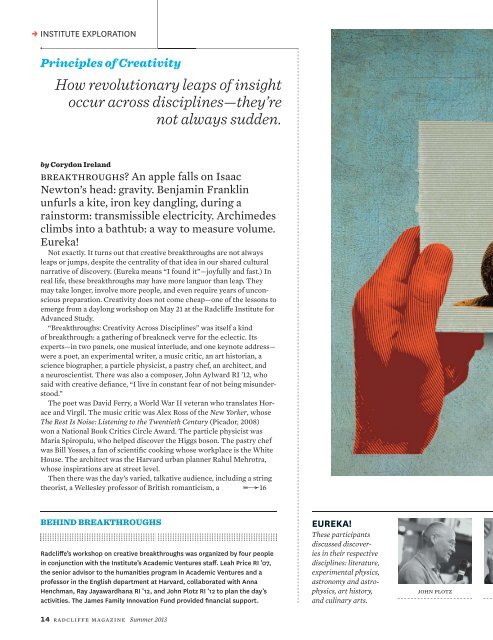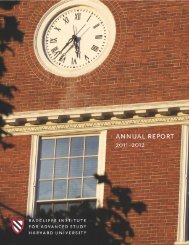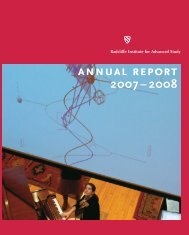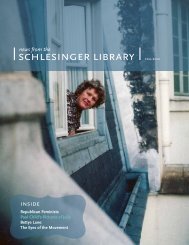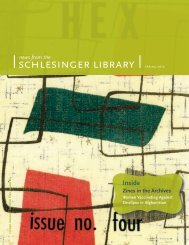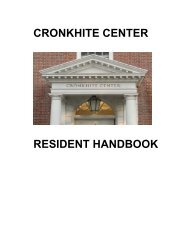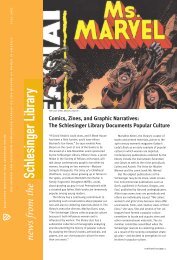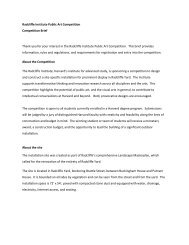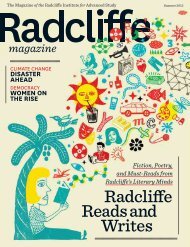Download - Radcliffe Institute for Advanced Study - Harvard University
Download - Radcliffe Institute for Advanced Study - Harvard University
Download - Radcliffe Institute for Advanced Study - Harvard University
Create successful ePaper yourself
Turn your PDF publications into a flip-book with our unique Google optimized e-Paper software.
V INSTITUTE EXPLORATION<br />
Principles of Creativity<br />
How revolutionary leaps of insight<br />
occur across disciplines—they’re<br />
not always sudden.<br />
by Corydon Ireland<br />
Breakthroughs An apple falls on Isaac<br />
Newton’s head: gravity. Benjamin Franklin<br />
unfurls a kite, iron key dangling, during a<br />
rainstorm: transmissible electricity. Archimedes<br />
climbs into a bathtub: a way to measure volume.<br />
Eureka!<br />
Not exactly. It turns out that creative breakthroughs are not always<br />
leaps or jumps, despite the centrality of that idea in our shared cultural<br />
narrative of discovery. (Eureka means “I found it”—joyfully and fast.) In<br />
real life, these breakthroughs may have more languor than leap. They<br />
may take longer, involve more people, and even require years of unconscious<br />
preparation. Creativity does not come cheap—one of the lessons to<br />
emerge from a daylong workshop on May 21 at the <strong>Radcliffe</strong> <strong>Institute</strong> <strong>for</strong><br />
<strong>Advanced</strong> <strong>Study</strong>.<br />
“Breakthroughs: Creativity Across Disciplines” was itself a kind<br />
of breakthrough: a gathering of breakneck verve <strong>for</strong> the eclectic. Its<br />
experts—in two panels, one musical interlude, and one keynote address—<br />
were a poet, an experimental writer, a music critic, an art historian, a<br />
science biographer, a particle physicist, a pastry chef, an architect, and<br />
a neuroscientist. There was also a composer, John Aylward RI ’12, who<br />
said with creative defiance, “I live in constant fear of not being misunder-<br />
stood.”<br />
The poet was David Ferry, a World War II veteran who translates Horace<br />
and Virgil. The music critic was Alex Ross of the New Yorker, whose<br />
The Rest Is Noise: Listening to the Twentieth Century (Picador, 2008)<br />
won a National Book Critics Circle Award. The particle physicist was<br />
Maria Spiropulu, who helped discover the Higgs boson. The pastry chef<br />
was Bill Yosses, a fan of scientific cooking whose workplace is the White<br />
House. The architect was the <strong>Harvard</strong> urban planner Rahul Mehrotra,<br />
whose inspirations are at street level.<br />
Then there was the day’s varied, talkative audience, including a string<br />
theorist, a Wellesley professor of British romanticism, a EE16<br />
BEHIND BREAKTHROUGHS<br />
<strong>Radcliffe</strong>’s workshop on creative breakthroughs was organized by four people<br />
in conjunction with the <strong>Institute</strong>’s Academic Ventures staff. Leah Price RI ’07,<br />
the senior advisor to the humanities program in Academic Ventures and a<br />
professor in the English department at <strong>Harvard</strong>, collaborated with Anna<br />
Henchman, Ray Jayawardhana RI ’12, and John Plotz RI ’12 to plan the day’s<br />
activities. The James Family Innovation Fund provided financial support.<br />
EUREKA!<br />
These participants<br />
discussed discoveries<br />
in their respective<br />
disciplines: literature,<br />
experimental physics,<br />
astronomy and astrophysics,<br />
art history,<br />
and culinary arts.<br />
John Plotz<br />
14 radcliffe magazine Summer 2013


